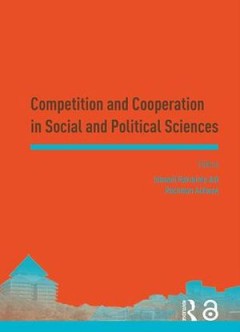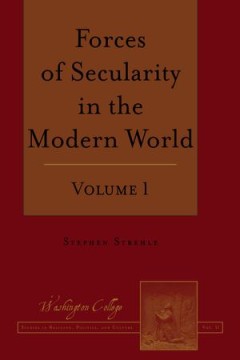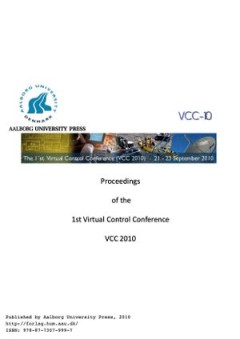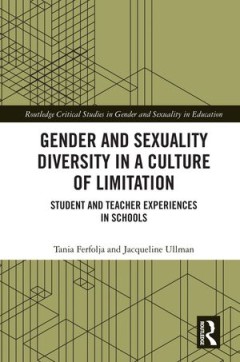Filter by

Competition and Cooperation in Social and Political Sciences
The book contains essays on current issues in Social and Political Sciences, such as the issues of governance and social order; social development and community development; global challenges and inequality; civil society and social movement; IT-based community and social transformation; poverty alleviation and corporate social responsibility; and gender issues.
- Edition
- -
- ISBN/ISSN
- 9781315213620
- Collation
- -
- Series Title
- -
- Call Number
- 306.2 ACH c

Forces of Secularity in the Modern World Volume 1
Stephen Strehle is a leading scholar of church/state issues. In this volume, he focuses his rigorous historical analysis and philosophical acumen upon a topic of great interest today and source of cultural wars around the globe—the process of secularization. The book starts with a discussion of early capitalism and how it saw the real world functioning well-enough on its own principles of ind…
- Edition
- -
- ISBN/ISSN
- 9781433143588
- Collation
- -
- Series Title
- -
- Call Number
- -

Process Control of Activated Sludge Plants by Microscopic Investigation
Process stability and final effluent quality largely depend upon the composition of the biomass in an activated sludge plant. Operational problems such as bulking and scum formation occur when the wrong micro-organisms are dominating the sludge population. Microscopic sludge investigation is therefore essential for process control and stable plant operation. The manual outlines the theoretical …
- Edition
- -
- ISBN/ISSN
- 9781900222297
- Collation
- -
- Series Title
- -
- Call Number
- -

Proceedings of the 1st Virtual Control Conference VCC 2010
Contents Reference Tracking and Profit Optimization of a Power Plant Modeling and Control of an Experimental pH Neutralization Plant using Neural Networks based Approximate Predictive Control Sensitivity Analysis of the LMI-based H-inf Control Problem Revisited H-inf control with transients: LMI based time-invariant outputfeedback controllers Robust H-inf Output Feedback Sliding Mode Control Wi…
- Edition
- -
- ISBN/ISSN
- 9788773079997
- Collation
- -
- Series Title
- -
- Call Number
- -

Islamic Studies in the Twenty-first Century Transformations and Continuities
In recent decades, traditional methods of philology and intellectual history, applied to the study of Islam and Muslim societies, have been met with considerable criticism from rising generations of scholars who have turned to the social sciences, most notably anthropology and social history, for guidance. This change has been accompanied by the rise of new fields, studying, for example, Islam …
- Edition
- -
- ISBN/ISSN
- 9789089649263
- Collation
- -
- Series Title
- -
- Call Number
- -

Preparing Urban Water Use Efficiency Plans: A Best Practice Guide
Many communities are facing water scarcity in developing and developed countries alike. There are numerous publications and on-going research studies documenting the changes in our climate and potential for worsening shortages in our future. Meeting future potable water demands as communities continue to grow will rely heavily on using our existing water resources more efficiently. Preparing…
- Edition
- -
- ISBN/ISSN
- 9781780405247
- Collation
- -
- Series Title
- -
- Call Number
- -

Gender and Sexuality Diversity in a Culture of Limitation Student and Teacher…
Gender and Sexuality Diversity in a Culture of Limitation provides an outstanding and insightful critique of the ways that contemporary education is impacted by a range of political, social and cultural influences that inform the approaches that schools take in relation to gender and sexuality diversity. By applying feminist poststructural and Foucauldian frameworks, the book examines the ongoi…
- Edition
- -
- ISBN/ISSN
- 9781351666046
- Collation
- -
- Series Title
- -
- Call Number
- -

Precision Agriculture Technology for Crop Farming
This book provides a review of precision agriculture technology development, followed by a presentation of the state-of-the-art and future requirements of precision agriculture technology. It presents different styles of precision agriculture technologies suitable for large scale mechanized farming; highly automated community-based mechanized production; and fully mechanized farming practices c…
- Edition
- -
- ISBN/ISSN
- 9781482251081
- Collation
- -
- Series Title
- -
- Call Number
- -

Food Taboos and Biblical Prohibitions Reassessing Archaeological and Literar…
This volume presents contributions from »The Larger Context of the Biblical Food Prohibitions: Comparative and Interdisciplinary Approaches« conference held in Lausanne in June, 2017. The biblical food prohibitions constitute an excellent object for comparative and interdisciplinary approaches given their materiality, their nature as comparative objects between cultures, and their nature as a…
- Edition
- -
- ISBN/ISSN
- 9783161593550
- Collation
- -
- Series Title
- -
- Call Number
- -

Dialog über die Liebe - Amatorius BOOK 2018 Dialog über die Liebe - Amat…
- Edition
- -
- ISBN/ISSN
- 9783161488245
- Collation
- -
- Series Title
- -
- Call Number
- -
- Edition
- -
- ISBN/ISSN
- 9783161488245
- Collation
- -
- Series Title
- -
- Call Number
- -
 Computer Science, Information & General Works
Computer Science, Information & General Works  Philosophy & Psychology
Philosophy & Psychology  Religion
Religion  Social Sciences
Social Sciences  Language
Language  Pure Science
Pure Science  Applied Sciences
Applied Sciences  Art & Recreation
Art & Recreation  Literature
Literature  History & Geography
History & Geography